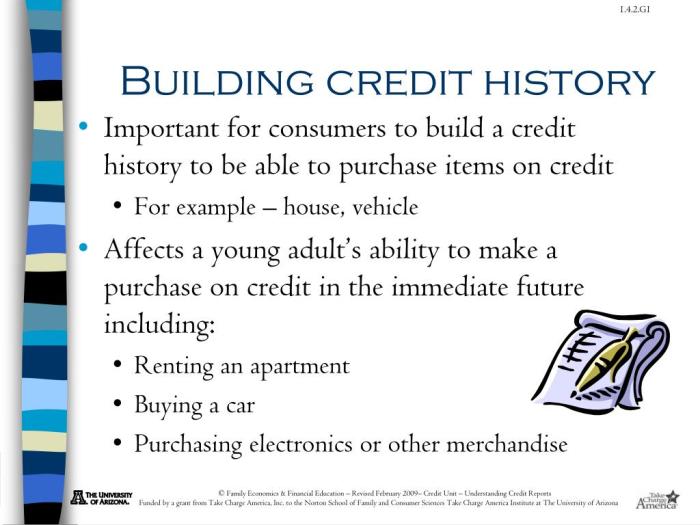Step into the world of Building credit history where financial opportunities await. Get ready for a wild ride as we uncover the importance of credit history, how to start building it, factors that affect it, and strategies to improve it.
Importance of Building Credit History
Building a credit history is essential for maintaining financial health in today’s world. It serves as a record of your borrowing and repayment behavior, allowing lenders to assess your creditworthiness. Without a solid credit history, it can be challenging to secure loans, credit cards, or favorable interest rates.
Impact on Loan Approvals and Interest Rates
A strong credit history can significantly impact your ability to obtain a loan. Lenders use your credit score to determine the risk associated with lending you money. A higher credit score indicates that you are a responsible borrower, making you more likely to be approved for loans. Additionally, a good credit history can lead to lower interest rates on loans, saving you money in the long run.
Benefits of Having a Good Credit Score
Having a good credit score opens up a world of financial opportunities. It can make it easier to qualify for mortgages, auto loans, and credit cards. With a good credit history, you may also be eligible for higher credit limits and better rewards on credit cards. Overall, a good credit score can pave the way for a brighter financial future.
How to Start Building Credit History

To begin building your credit history, it’s essential to take the right steps from the start. Here are some key tips for beginners:
Apply for a Secured Credit Card
When starting to build credit, one of the first steps you can take is to apply for a secured credit card. Secured credit cards require a cash deposit that serves as collateral, making them easier to qualify for when you have limited or no credit history. By using a secured credit card responsibly and making timely payments, you can start establishing a positive credit history.
Make Timely Payments and Keep Credit Utilization Low
One of the most crucial aspects of building credit history is making timely payments on all your credit accounts. Late payments can have a significant negative impact on your credit score. Additionally, keeping your credit utilization low by not maxing out your credit cards and only using a small percentage of your available credit limit can help improve your credit score over time.
Monitor Credit Reports Regularly
It’s important to monitor your credit reports regularly to ensure that all information is accurate and up to date. By checking your credit reports from the three major credit bureaus – Equifax, Experian, and TransUnion – you can spot any errors or signs of identity theft early on. You are entitled to one free credit report from each bureau every year, which you can access through annualcreditreport.com.
Factors Affecting Credit History
When it comes to building a strong credit history, there are several key factors that can significantly impact your credit score. Understanding these factors is essential for maintaining good credit health and improving your financial standing.
Payment History
Your payment history is one of the most important factors that influence your credit score. Making on-time payments consistently demonstrates to lenders that you are a responsible borrower. Late payments, on the other hand, can have a negative impact on your credit history and lower your credit score.
Types of Credit Used
The types of credit accounts you have also play a role in determining your credit score. Lenders like to see a healthy mix of credit, including credit cards, installment loans, and mortgages. Having a diverse portfolio of credit accounts can show that you can manage different types of debt responsibly.
Credit Inquiries and Credit Age
Every time you apply for new credit, a hard inquiry is made on your credit report, which can temporarily lower your credit score. It’s important to be mindful of how often you apply for new credit to avoid unnecessary inquiries. Additionally, the age of your credit accounts also matters. Generally, the longer your credit history, the better it is for your credit score.
Credit Utilization Ratio
Your credit utilization ratio is another crucial factor in building a positive credit history. This ratio represents the amount of credit you are using compared to the total amount of credit available to you. Keeping your credit utilization low, ideally below 30%, can demonstrate to lenders that you are not overly reliant on credit and can manage your finances responsibly.
Strategies to Improve Credit History
Improving your credit history is crucial for financial stability and obtaining better loan terms. By following certain strategies, you can enhance your credit profile and increase your credit score.
Pay Off Debts and Avoid Late Payments
- Make timely payments on all your credit accounts to avoid late fees and negative marks on your credit report.
- Focus on paying off high-interest debts first to reduce overall debt and improve your credit utilization ratio.
- Consider setting up automatic payments to ensure you never miss a due date.
Diversify Credit Accounts and Maintain a Long Credit History
- Having a mix of credit accounts, such as credit cards, loans, and a mortgage, can demonstrate responsible credit management.
- Keep older accounts open to show a longer credit history, which can positively impact your credit score.
- Use credit cards regularly but responsibly to build a strong credit history over time.
Negotiate with Creditors and Manage Outstanding Balances Effectively
- If you’re struggling to make payments, contact your creditors to discuss payment options or negotiate a lower interest rate.
- Create a budget to prioritize debt repayment and avoid accumulating more debt than you can afford to repay.
- Monitor your credit report regularly to ensure accuracy and address any errors promptly to prevent them from negatively affecting your credit history.
